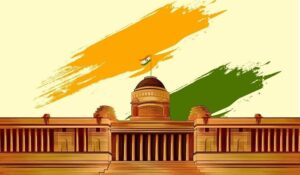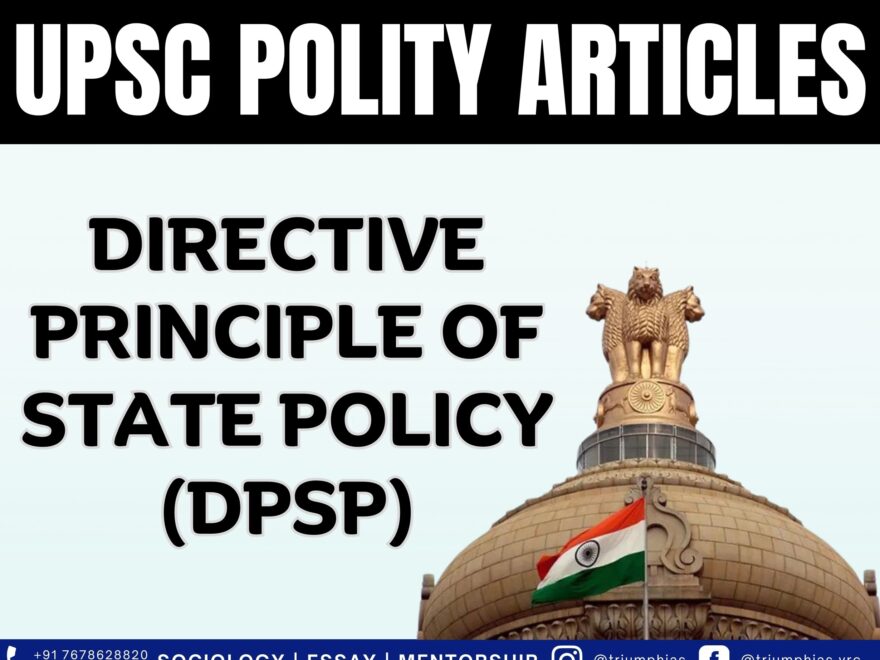Directive Principle of State Policy (DPSP)
(Relevant for Polity section of General Studies Paper Prelims/Mains)

The origin of the concept of Directive Principles of State Policy (DPSP) can be traced back to the Spanish Constitution, which influenced its inclusion in the Irish Constitution.
The concept of DPSP was introduced through Article 45 of the Irish Constitution.
Constitutional Provisions: The Directive Principles of State Policy (DPSP) are outlined in Part IV of the Indian Constitution (Article 36–51).
Article 37 of the Indian Constitution addresses the applicability of the Directive Principles.
These principles have the objective of ensuring socio-economic justice for the citizens and shaping India into a Welfare State.
Fundamental Rights Vs DPSP
In contrast to the Fundamental Rights (FRs), the scope of Directive Principles of State Policy (DPSP) is extensive, and they operate at a broader level to safeguard citizens’ rights.
DPSP encompasses a set of ideals that the State should consider and incorporate while devising policies and legislations for the nation.
Unlike Fundamental Rights, which impose limitations on the State, Directive Principles provide affirmative guidance.
However, DPSP is not legally enforceable; it lacks justiciability.
It’s noteworthy that Directive Principles and Fundamental Rights complement each other.
DPSP is not subservient to Fundamental Rights.
The Directive Principles are categorized based on their underlying ideologies and objectives. These categories include:
- Socialist Principles
- Gandhian Principles
- Liberal and Intellectual Principles
Amendments in DPSP:
The 42nd Constitutional Amendment of 1976 introduced several additions to Part IV of the Constitution, including new directives:
- Article 39A: Ensuring the provision of free legal aid to the economically disadvantaged.
- Article 43A: Promoting worker participation in the management of industries.
- Article 48A: Focusing on the protection and enhancement of the environment.
- The 44th Constitutional Amendment of 1978 brought about changes as well. It introduced Section-2 to Article 38, emphasizing the State’s efforts to reduce economic inequalities in income and eliminate disparities in status, facilities, and opportunities not only among individuals but also among groups. Additionally, this amendment removed the Right to Property from the roster of Fundamental Rights.
- The 86th Amendment Act of 2002 brought a significant alteration. It modified the content of Article 45, elevating elementary education to the status of a fundamental right, now covered under Article 21A.
Conflicts Between Fundamental Rights and DPSP: Associated Cases
- Champakam Dorairajan vs. the State of Madras (1951): In this legal proceeding, the Supreme Court rendered a verdict stating that when a conflict arises between the Fundamental Rights and the Directive Principles, the former would take precedence. The court affirmed that the Directive Principles must align with and operate as subsidiary to the Fundamental Rights. Additionally, it asserted that the Parliament holds the authority to amend the Fundamental Rights through the enactment of constitutional amendment acts.
- Golaknath vs. the State of Punjab (1967): In this case, the Supreme Court ruled that the Parliament did not possess the power to amend the Fundamental Rights, even for the purpose of implementing the Directive Principles. This decision was contradictory to its prior ruling in the ‘Shankari Parsad case’.
- Kesavananda Bharati vs. the State of Kerala (1973): In this legal matter, the Supreme Court overturned its previous Golak Nath (1967) judgment and decreed that the Parliament retains the capacity to amend any section of the Constitution, albeit without altering its “Basic Structure”. Consequently, the Right to Property (Article 31) was removed from the roster of Fundamental Rights.
- Minerva Mills vs. the Union of India (1980): In this case, the Supreme Court reaffirmed that the Parliament holds the ability to amend various sections of the Constitution; however, it is restricted from altering the “Basic Structure” of the Constitution.
Implementation of DPSP: Associated Acts and Amendments
Land Reforms: Virtually all states have enacted land reform legislation to bring about transformations in the rural society and enhance the living conditions of the rural populace. These initiatives encompass:
- Elimination of intermediaries like zamindars, jagirdars, inamdars, etc.
- Tenancy reforms, such as ensuring secure tenures and equitable rents.
- Imposition of limits on land ownership.
- Redistribution of excess land among landless laborers.
Introduction of cooperative farming.
Labor Reforms:
- Various acts have been enacted to safeguard the interests of the labor community within society.
- The Minimum Wages Act (1948), and subsequently the Code on Wages, 2020.
- The Contract Labour Regulation and Abolition Act (1970).
- The Child Labour Prohibition and Regulation Act (1986), which was renamed the Child and Adolescent Labour Prohibition and Regulation Act in 2016.
- The Bonded Labour System Abolition Act (1976).
- The Mines and Minerals (Development and Regulation) Act, 1957.
- The Maternity Benefit Act (1961) and the Equal Remuneration Act (1976), both introduced to protect the rights of female workers.
- Panchayati Raj System: Through the 73rd Constitutional Amendment Act of 1992, the government fulfilled the constitutional duty outlined in Article 40.
- The three-tier ‘Panchayati Raj System’ was established at the Village, Block, and District levels, covering almost all regions of the nation.
To master these intricacies and fare well in the Sociology Optional Syllabus, aspiring sociologists might benefit from guidance by the Best Sociology Optional Teacher and participation in the Best Sociology Optional Coaching. These avenues provide comprehensive assistance, ensuring a solid understanding of sociology’s diverse methodologies and techniques.
Directive Principles of State Policy, DPSP, Indian Constitution, socio-economic justice, welfare, Fundamental Rights, amendments, land reforms, labor reforms, implementation, associated cases, Constitution of India, legal proceedings, significance, Directive Principles of State Policy, DPSP, Indian Constitution, socio-economic justice, welfare, Fundamental Rights, amendments, land reforms, labor reforms, implementation, associated cases, Constitution of India, legal proceedings, significance, Best Sociology Optional Coaching, Sociology Optional Syllabus.

Choose The Best Sociology Optional Teacher for IAS Preparation?
At the beginning of the journey for Civil Services Examination preparation, many students face a pivotal decision – selecting their optional subject. Questions such as “which optional subject is the best?” and “which optional subject is the most scoring?” frequently come to mind. Choosing the right optional subject, like choosing the best sociology optional teacher, is a subjective yet vital step that requires a thoughtful decision based on facts. A misstep in this crucial decision can indeed prove disastrous.
Ever since the exam pattern was revamped in 2013, the UPSC has eliminated the need for a second optional subject. Now, candidates have to choose only one optional subject for the UPSC Mains, which has two papers of 250 marks each. One of the compelling choices for many has been the sociology optional. However, it’s strongly advised to decide on your optional subject for mains well ahead of time to get sufficient time to complete the syllabus. After all, most students score similarly in General Studies Papers; it’s the score in the optional subject & essay that contributes significantly to the final selection.
“A sound strategy does not rely solely on the popular
Opinion of toppers or famous YouTubers cum teachers.”
It requires understanding one’s ability, interest, and the relevance of the subject, not just for the exam but also for life in general. Hence, when selecting the best sociology teacher, one must consider the usefulness of sociology optional coaching in General Studies, Essay, and Personality Test.
The choice of the optional subject should be based on objective criteria, such as the nature, scope, and size of the syllabus, uniformity and stability in the question pattern, relevance of the syllabic content in daily life in society, and the availability of study material and guidance. For example, choosing the best sociology optional coaching can ensure access to top-quality study materials and experienced teachers. Always remember, the approach of the UPSC optional subject differs from your academic studies of subjects. Therefore, before settling for sociology optional, you need to analyze the syllabus, previous years’ pattern, subject requirements (be it ideal, visionary, numerical, conceptual theoretical), and your comfort level with the subject.
This decision marks a critical point in your UPSC – CSE journey, potentially determining your success in a career in IAS/Civil Services. Therefore, it’s crucial to choose wisely, whether it’s the optional subject or the best sociology optional teacher. Always base your decision on accurate facts, and never let your emotional biases guide your choices. After all, the search for the best sociology optional coaching is about finding the perfect fit for your unique academic needs and aspirations.
To master these intricacies and fare well in the Sociology Optional Syllabus, aspiring sociologists might benefit from guidance by the Best Sociology Optional Teacher and participation in the Best Sociology Optional Coaching. These avenues provide comprehensive assistance, ensuring a solid understanding of sociology’s diverse methodologies and techniques. Sociology, Social theory, Best Sociology Optional Teacher, Best Sociology Optional Coaching, Sociology Optional Syllabus.
Best Sociology Optional Teacher, Sociology Syllabus, Sociology Optional, Sociology Optional Coaching, Best Sociology Optional Coaching, Best Sociology Teacher, Sociology Course, Sociology Teacher, Sociology Foundation, Sociology Foundation Course, Sociology Optional UPSC, Sociology for IAS,
Follow us :
🔎 https://www.instagram.com/triumphias
🔎https://www.youtube.com/c/TriumphIAS
https://t.me/VikashRanjanSociology
Find More Blogs
|
Scope of the subject and comparison with other social sciences |
|||
|
|
|
|
Modernity and social changes in Europe |

